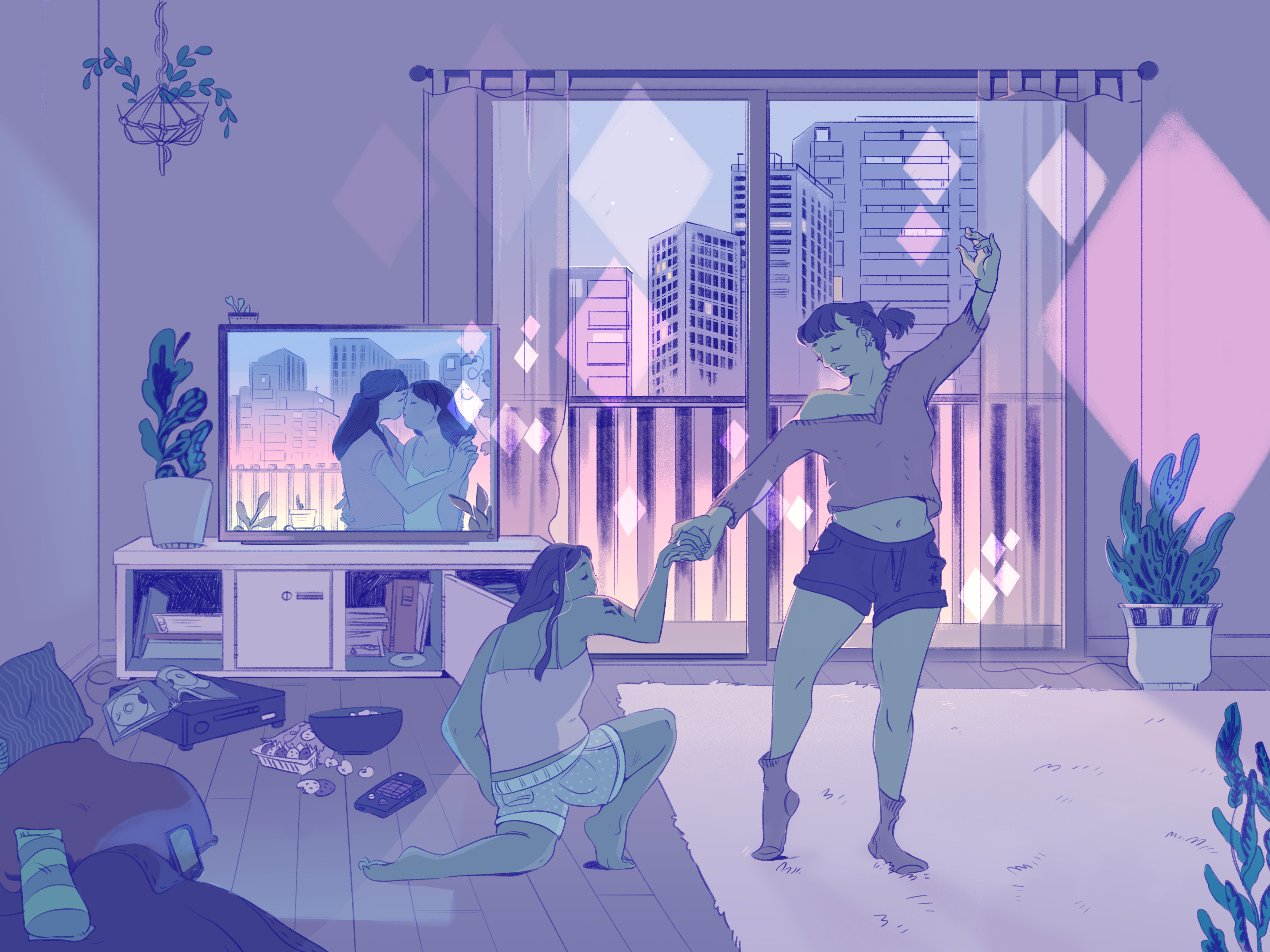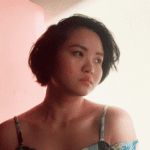“City Ballet Outreach. I’m teaching them how to fall without hurting themselves,” the dancer Vivian says, in the 2004 romantic drama Saving Face. “Here. I’ll show you.”
It’s totally letting go, she explains. Across her the character Wil crosses her arms. “I’m sorry. I can’t do this.”
I’m 14 and I think it’s metaphor for whatever I’ve been feeling each time I look at my classmate M, a long-limbed miracle in our mandatory blouse-and-tie uniforms. Last week, she had taken me aside and said we weren’t really best friends.
“I don’t understand,” I said, stung.
“Like this,” she took my hand. “I mean it like this.”
That explained very little — especially in Singapore, where women often held hands in the most intimate and platonic of gestures. But it’s one week later and I’m watching this scene where none of this is literal until it is.
On the screen, Vivian pulls Wil very close. She touches Wil’s mouth and then they’re kissing. They are women who look like me, kissing, and this too is something I don’t have a name for yet. I simply sit there, transfixed, feeling the ground shift beneath me as distance between them shrinks, the point of contact between them growing into a window.
I was young but already beginning to understand that love stories meant the script of boy gets girl, fractured through the screen. On Singaporean TV it usually meant Chinese boy gets Chinese girl, and in Hollywood films it was white boy gets white girl. I learned very quickly Asian people were somehow considered interchangeable in North America, although they mostly meant light-skinned East Asians, and all of us worked at the laundromat.
By the time I made my way to Grade 12, boy gets girl sometimes meant white boy gets the exotic Asian girl. Films like the The Barbarian and the Geisha never went away — instead, they were replaced with contemporary images, like James Bond and Colonel Wai Lin in 1997’s Tomorrow Never Dies, or Brenda Song as Andrew Garfield’s girlfriend in 2010’s The Social Network.
More often than not, when an Asian woman appeared on screen she was exoticized, like in the incredibly-inaccurate Memoirs of a Geisha. And these Asian girls, these Asian women, were the closest things I had to mirrors in the Western world.
But while these films provided a blueprint to understanding how I was expected to move through the world as an Asian woman, they also informed how women like me were valued by men.
“I cycled through the stories of people who, like me, didn’t love who they were supposed to.”
Data from a 2013 Facebook dating app revealed Asian women were the most sought-after group by men of all races.
This hypersexualization can take intense forms; Debbie Lum’s 2013 documentary Seeking Asian Female details a white American man’s quest to marry a Chinese woman because, “there’s this Vietnamese movie called The Scent of Green Papaya that has this servant girl who cooks these beautiful meals. Gee, would it be like that?”
In the same vein, there was no shortage of the way predominantly white men on the Internet would taunt Asian women in forums and blogs with “me love you long time,” a reference to a line uttered by a Vietnamese sex worker to an American GI in Full Metal Jacket.
And little has changed since 1987: despite becoming the first Asian woman with a leading role in the Star Wars franchise, Vietnamese-American actress Kelly Marie Tran faced such intense sexual and racial harassment in 2018 that she deleted her Instagram posts.
What it really means is you can be seen, but you’re still a thing to own.
When I discovered Kill Bill, it was the first time I saw an Asian woman in a Hollywood film who wasn’t on a white man’s arm or some submissive, Orientalist fantasy. There was a frisson of shock — that’s me! — strong enough for me to ignore the fact that her character was Japanese even though Lucy Liu is not, or the fact that she embodied the trope of the beautiful and strong “Dragon Lady” seductress.
And this fleeting joy lasted, of course, until her character was killed by Uma Thurman’s. When the killing blow came I watched her body curled up in the snow, the white beneath her body like a blank page. I was all too aware that her face could almost be mine.
After Saving Face, I went looking for more films with those types of love stories. I watched Brokeback Mountain and A Single Man, and then Milk and Weekend. I cycled through the stories of people who, like me, didn’t love who they were supposed to.
Yet I privately wondered why the stories about this sort of love so often featured men who looked exactly like those hurting women like me in porn. Violent depictions of Asian women are epidemic: researcher Sunny Woan notes that in American pornography, images of Asian women come up repeatedly when the search term “torture” is used. According to another 2002 study, more than half of rape scenes across 31 porn sites featured Asian women as victims, and one-third featured White men as their rapists.
That gay men who looked exactly like them were the dominant images of non-heterosexuality, of understanding some part of myself — it was unbearable.
“I go through some years thinking what I saw in Saving Face was a trick of the light, a product of my own longing.”
By then I knew what the term gay meant, but I didn’t understand what I was looking for. Flipping through magazines in the dentist’s office was when the word first leapt out at me: above a photograph of two white women, the word lesbian in bold text plastered across the American tabloid. They looked like every other famous white person I had seen in magazines, their faces bent close and hidden behind sunglasses as if shrinking from the camera’s flash.
But: they were women, even if they were white. So I find But I’m A Cheerleader and Imagine Me and You, and try to imagine myself as a white woman in love with another white woman. I go through some years thinking what I saw in Saving Face was a trick of the light, a product of my own longing.
It might as well have been: overwhelmingly, representations of LGBT people in media are white men. The 2016-2017 GLAAD breakdown of queer characters revealed five percent of characters on cable primetime scripted series were Asian-Pacific Islander, then 13 percent for broadcast networks, and three percent for streaming original series.
According to a GLAAD finding of 109 films from major studios in 2017, 64 percent and 43 percent of LGBT characters were gay men and white, respectively. There were zero Asian or Pacific Islander LGBT characters in any of these films in 2017.
Let that sink in: in 2017, no one like me existed in major films.
Eventually, despite the lack of fanfare in mainstream media, despite overwhelming praise for films like Carol and Blue is the Warmest Colour in all their stifling whiteness (despite accusations of the director’s cruel treatment by his actresses in the latter film), I find I Can’t Think Straight, a British romantic drama featuring an Indian woman and a Palestinian-Jordanian woman. I find other love stories between racialized women, like Baka Bukas, Pariah and Tangerine. I find The Handmaiden.
What you see in the mirror is closer than it appears. Isn’t that what they print on safety labels? With each queer woman of colour — with each queer Asian woman — it feels like an uncovering, another light caught in the glass. It feels like sight.
“The distance between my body and whiteness was the distance between my desire and straightness.”
In Yes or No, Pie says of pushing her lover Kim away: “I was afraid. I was afraid of everything.”
I had been afraid as well, I realized. The distance between my body and whiteness was the distance between my desire and straightness. Poised on the precipice of being Asian, queer and a woman meant there were a myriad of ways I could vanish, and I saw it each time I watched a movie or caught a film — or I guess I didn’t. That was a kind of vanishing too.
I’m getting ahead of myself.
Back to the scene in Saving Face, before I watch two Asian women kiss for the first time, before I begin understanding what it means to be a queer Asian woman, Vivian demonstrates the dance move.
“When I say fall, you totally let go,” she explains.
Wil looks at her. I can see the question in her eyes: is it really that easy?
On the screen, Vivian pulls her very close. Wil relaxes incrementally with some unspoken understanding of how this is supposed to go. And when Vivian pushes her, she falls to the ground in one smooth, swift motion.
Wil looks up, amazed. She’s fallen, as Vivian had told her she would, whole and unharmed.
The film keeps rolling. Vivian falls beside her and pulls her close. I’m watching my own reflection in the dimly-lit room, superimposed over the image of two women on the family computer screen, and that moment feels like an answer to every question I never allowed myself to ask.
When I say fall, you totally let go. This is the moment before they kiss.
Everything is metaphor until it isn’t.


 Why you can trust Xtra
Why you can trust Xtra


